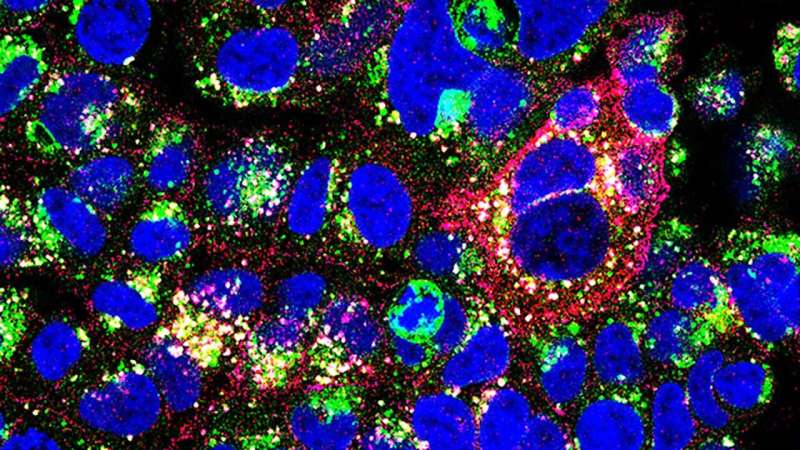This article has been reviewed according to Science X's editorial process and policies. Editors have highlighted the following attributes while ensuring the content's credibility:
fact-checked
peer-reviewed publication
trusted source
proofread
New antibody could target breast cancers

An enzyme that may help some breast cancers spread can be stopped with an antibody created in the lab of Cold Spring Harbor Laboratory Professor Nicholas Tonks. With further development, the antibody might offer an effective drug treatment for those same breast cancers.
The new antibody targets an enzyme called PTPRD that is overabundant in some breast cancers. PTPRD belongs to a family of molecules known as protein tyrosine phosphatases (PTPs), which help regulate many cellular processes. They do this by working in concert with enzymes called kinases to control how other proteins inside cells behave. Kinases add small chemical regulators called phosphates to proteins. PTPs take them off.
Disruptions in the addition or removal of phosphates can contribute to inflammation, diabetes, and cancer. Some disruptions can be corrected with kinase-blocking drugs.
"People have targeted kinases for 25, 30 years," Tonks explains. "It's a multibillion-dollar industry. But many challenges remain. In cancer, patients will respond to these sorts of kinase inhibitors and then, after a period of time, resistance develops."
Drugs that control PTP activity could have a major impact on human health. However, such drugs have been difficult to develop. Tonks has studied PTPs since he discovered them as a postdoctoral researcher. He calls the enzymes "an untapped resource for drug development."
Many enzymes can be switched off with small molecules designed to latch onto and block the part of the enzyme that carries out its work. But that won't work for PTPs like PTPRD. So, alternative strategies are necessary.
To stop PTPRD activity, graduate student Zhe Qian devised a new kind of PTP blocker. He targeted the enzyme with a synthetic antibody—a molecule that recognizes and binds to its target in a particular fashion. PTPRD molecules sit nestled in the outer membranes of cells, with bits protruding inside and out. Qian designed his antibody to grab onto two PTPRD molecules from outside a cell simultaneously.
Qian and colleagues in the Tonks lab showed that when the antibody binds to its target, it draws pairs of PTPRD proteins together into an inactive configuration. This not only prevents PTPRD from working but also leads to the protein's destruction. The team has shown that once this happens, breast cancer cells growing in the lab become less invasive.
Tonks and Qian say the same strategy might be used to block the possible metastasis-promoting enzyme in patients with breast cancer. Tonks adds that this might be particularly effective when combined with a kinase-targeting drug.
The findings are published in the journal Genes & Development.
More information: Zhe Qian et al, Manipulating PTPRD function with ectodomain antibodies, Genes & Development (2023). DOI: 10.1101/gad.350713.123



















